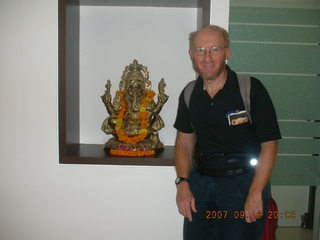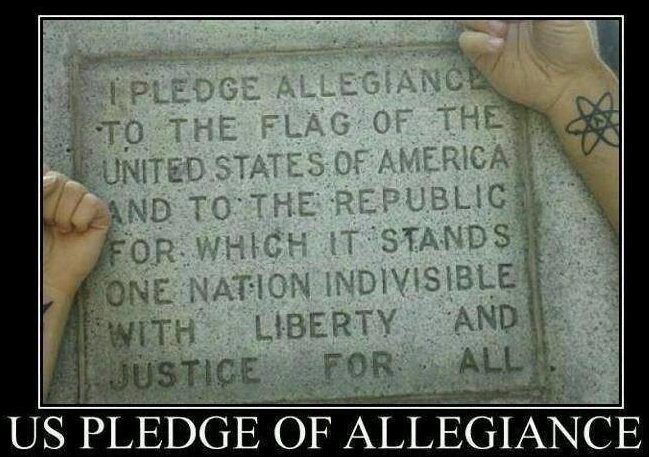Fallacy Three:
Christianity in particular and religion in general
is a good source of guidance for America's political future.
My first objection is simply
that what brought horror in the past
isn't a good thing for the future.
The correlation between tyranny and religion in politics
is the same as the correlation between tyranny and socialism.
The evidence that those who preach compassion and decency
exercise those virtues in their own lives
any more than those who are silent on compassion and decency
is slim indeed.
Counting on the priesthood and ministry to be free of evil
doesn't sound like a good plan.
Most of the tyranny that used to be religion in politics
has moved seamlessly to socialism.
Helping the poor in spirit has changed to helping the poor.
(This is another reference
to The Fountainhead.)
To pick another example,
even if we admit that the
White Knights of the Ku Klux Klan
and the German Nazis are faint ghosts
of their horrible pasts,
I'm not sure I want people wearing
white sheets and swastika armbands
strolling around my neighborhood.
Another issue is that tying decency and values to religion
gives an easy out to those who reject them.
Should people who don't go to church
feel unaccountable to morality?
Also, once we pick a religion such as Christianity,
are those who aren't Christians not part of America?
For whatever reasons, the differences between religions
has been divisive rather than
inclusive.
America's values should include all Americans
and it should welcome all those who want to become Americans.
My Concern:
I believe
those who justify America's values
as solely Christian values
are far less likely than non-religious supporters
to come to the aid of Jews
when we need their help.
Those of us who have been paying attention are seeing a rise in
anti-semitism
here in the United States of America.
It follows a similar recent wave of hate in western Europe
and it also follows the pattern of political hate
eighty-five years ago in central Europe.
I think of Jews as the canaries in the political mine,
we tend to die first when the atmosphere gets bad.
Of the twenty-one million of his own citizens Hitler killed
six million were Jews, highly disproportionate.
Those of us whose names end in Berg or Stein
have plenty to worry about in today's version of America.
I have confidence that many of those who support American values
as described in my web pages as well as other scholarly works
would use their deadly force to protect us
when the men in the brown shirts come for us,
just as they came to the aid of black Americans
sixty years ago during the Civil Rights movement.
There's a strong feeling we're all in this together
against the socialist progressive left-wing river of hate.
I have less confidence in those who base their values
solely on Christianity.
Those who reject non-Christians as participants
in a society of moral values
are less likely to come to the aid of those non-Christians
when the going gets rough.
I don't recall Jews having a lot of friends
in Vatican City during Herr Hitler's holocaust.
Those who claim our general American foundation values
as only Christian might want to consider how poorly
Christian leaders throughout history have adhered to these
so-called Christian values.
We need and we should want a broader base of support
for our beliefs.
I'm comfortable with Christianity being a basis for morality.
I believe most Americans get their values from their religion
and I'm fine with that.
It's when they actively reject alternative points of view
that I become afraid.
America's values come from many sources including
religion, economic success, intellect, and historical experience.
Those who accept all of these as legitimate sources of support
for human life, liberty, livelihood, property, and contract
make me more comfortable than those who
can only see Jesus Christ as the path to political success.
Conclusion.
We can eat our cake and have it too.
We can keep our religion and our science
and our ethics and our normative perspective
and our Ayn-Randian intellectualism
and our utilitarian historical precedent.
All of these point to the same
values of
human life, liberty, livelihood, property, and contract.
In our fight against the horrors of progressivism and socialism
we do not have the luxury of saying,
"Only my way to the truth is valid."
Should we exclude 5500 million non-Christians
as not eligible or not worthy of participation
in the American ideal of personal freedom and liberty?
I have said religion is the right profile
of the same monster whose left profile is politics.
I'll narrow that down that Christianity in politics
is the right profile
of the same monster whose left profile is socialism.
None of it belongs in our political universe
as these are personal
choices.
It's time to look for ways to include
as many mindsets, attitudes, and beliefs
that point us to a free, healthy, and prosperous America.
From the movie "Chocolat,"
"I think we can't go around
measuring our goodness
by what we don't do,
by what we deny ourselves,
what we resist,
and who we exclude.
I think we've got to measure goodness
by what we embrace,
what we create, and who we include."
If you like what you read here
(Hah!),
then
here
are my other American-issues essays.
THE ADAM HOME PAGE
adam@the-adam.com
 Before I launch into my main message,
I'll start with one of those dorm-at-night questions:
Who was worse, Josef Stalin or Adolf Hitler?
According to a cool
web site
they were both terrible.
Comrade Stalin's Soviet Gulag State
killed 62 million of his own citizens and
Herr Hitler's National Socialism
killed 21 million.
Before we declare Stalin the winner of the
Worst-Person-of-the-Twentieth-Century Award,
we should note that Stalin won and Hitler lost,
so just think of what damage Hitler would have done
had his National Socialist German Workers' (Nazi) Party
been victorious.
If we made the terrible decision to resurrect
either of these two men's
visions,
then it isn't clear whose would be more horrible.
Before I launch into my main message,
I'll start with one of those dorm-at-night questions:
Who was worse, Josef Stalin or Adolf Hitler?
According to a cool
web site
they were both terrible.
Comrade Stalin's Soviet Gulag State
killed 62 million of his own citizens and
Herr Hitler's National Socialism
killed 21 million.
Before we declare Stalin the winner of the
Worst-Person-of-the-Twentieth-Century Award,
we should note that Stalin won and Hitler lost,
so just think of what damage Hitler would have done
had his National Socialist German Workers' (Nazi) Party
been victorious.
If we made the terrible decision to resurrect
either of these two men's
visions,
then it isn't clear whose would be more horrible.

